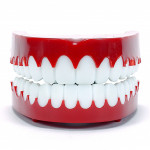Randall Ai balked when his doctor suggested he visit a dentist for a fungal infection in his mouth. Not only was Ai (like the rest of us) dental phobic, he had HIV fears too. He’d recently been diagnosed, and “I wasn’t ready to tell others I was positive,” says Ai, now 50. What’s more, like many other positive people, he had heard tales of HIV-phobic dentists. But Ai finally found the resolve to book an appointment—and not a moment too soon: Along with thrush, his dentist found gingivitis, which was causing Ai’s gums to recede. That poses a risk of infection and is more common in people with HIV than in others.
Ai wasn’t legally required to disclose to his dentist, and many people think disclosure isn’t medically necessary either. HIV-savvy dentists, however, argue that sharing your status can benefit not only your oral health but the rest of you.
“The initial indication of a weakening immune system sometimes appears in the mouth,” says Steven Vitero, DDS, of AIDS Project Los Angeles, so dentists may be first responders. Your mouth may reveal HIV-med problems too: Oral infections like hairy leukoplakia and thrush (rarer now than before HIV combo therapy) tell Vitero that “a patient’s HIV treatment may not be working.” Calix Ramos, DMD, of New York City’s Callen-Lorde Community Health Center, adds, “I can’t make a correct diagnosis and give appropriate care if I don’t know your medical history.”
Vitero recommends telling your dentist your viral load, CD4 and neutrophil counts (neutrophils, white blood cells that fight infection, appear in your complete blood count or CBC). CD4 counts signal your risk of opportunistic oral infections. Neutrophil levels indicate how your body can handle an onslaught of bacteria—a possible result of bleeding in dental procedures. If neutrophils are low, your dentist might prescribe antibiotic pills to swallow before your appointment (standard for those with heart valve issues).
Some HIV oral problems can grow serious if untended. “Oral thrush starts as a small spot on the palate,” Vitero says. “You have to treat it before it gets into the throat and lungs.” Gum disease and painful, white canker sores called aphthous ulcers are other risks, even with good immune health. If gum or tooth pain interferes with chewing your food, you may have trouble meeting HIV’s extra nutritional requirements. Your dentist can treat these with medication and regular cleanings.
Another common malady: dry mouth, sometimes caused by HIV meds and antidepressants. “When saliva decreases, the pH level changes, setting up the mouth for decay,” says Jonathan Levine, DMD. Rx: prescription meds or sugar-free gum, artificial saliva and fluoride mouthwash.
Failing to brush and floss regularly causes plaque and bacteria buildup, Levine says. The resulting gum inflammation and sores may usher bacteria into your blood, possibly causing serious problems like cardiovascular disease. Vitero suggests using a soft toothbrush twice a day (after every meal is better) and flossing daily.
Before he found his dentist, Randall Ai often skipped the floss. “I now floss every day and get cleanings every three months, and my teeth have never looked better,” he says. “And I find myself focusing on other people’s teeth when I talk with them.” So he’s opened his eyes along with his mouth.
Randall Ai found his dentist through a referral from his Department of Public Health caseworker. Your local AIDS service organization; the AIDS Survival Project (404.874.7926); and www.hivdent.org also offer referrals.


Istock
Mouthing Off
Sink your teeth into HIV health care






Comments
Comments